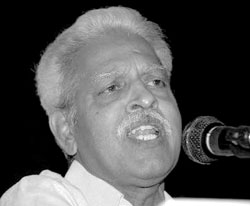|
|
| TWIN REVOLUTIONARIES: Telugu poet Vara Vara Rao who is considered the face of the Naxalites (above) with balladeer Gaddar (below) acted as an emissary for Indian Naxalites. |
Indian Maoists are feeling vindicated by the recent setbacks suffered by their Nepali comrades and are full of scorn for them.
Here in Andhra Pradesh, which has been a hotbed for Naxalite activity because of government neglect and entrenched caste and class inequities, the Nepalis sold out on the revolution when victory are seem to have so close at hand.
Indian and international Maoists always saw Nepal as a vanguard of their world revolution. They provided training and material assistance in the early days, and they saw Nepal as a source of hope during the war.
The disillusionment first set in when India's moderate left which is a partner in the central government steered the 12-point peace deal that was signed in November 2006 in New Delhi. The Communist Party of India (Maoist) saw that as a surrender.
And when Pushpa Kamal Dahal told The Hindu newspaper that Indian Maoists should learn a lesson from them there was anger among the Naxals who see themselves as the pioneers of the South Asian revolution.
Now, the anger has turned to mockery as they watch the Nepali Maoists squirm. They think the present plight of the Nepali Maoists stems from weakness and incoherence.
 "We had told them not to give up armed struggle, based on our own experience of doing so in Telengana in 1951," Varavara Rao, the Telegu writer considered the public face of the Indian rebels, told us last week. "Your Maoists have neither been able to change the nature of the state nor even abolish the monarchy."
"We had told them not to give up armed struggle, based on our own experience of doing so in Telengana in 1951," Varavara Rao, the Telegu writer considered the public face of the Indian rebels, told us last week. "Your Maoists have neither been able to change the nature of the state nor even abolish the monarchy."
Ganapathy, the leader of the Indian Maoists, said in a recent interview about the Nepali comrades: "They will either have to get co-opted into the system or abandon the present policy of power-sharing with the ruling class and continue the armed revolution to seize power. There is no Buddhist middle way. They cannot set the rules for a game the bourgeoisie invented."
Pro-Maoist intellectuals in Hyderabad told us the Nepali Maoists are now stuck. "It's too late," said one Maoist-affiliated journalist. "They neither have the gun nor mass support. They should have listened to us."
What has riled the Naxalites most is the continued hobnobbing of the Nepal Maoists with both the Indian state and the mainstream CPI-Marxist.
"Sitaram Yechury is an agent of the Indian ruling classes and is making money off the present process in Nepal. We cannot trust the Nepali Maoists anymore," says Gadar, the most popular 'revolutionary' poet in the state. He claims that Indian police officials asked him to emulate the Nepal example a year ago. "When the enemy puts up someone as an example, then something is obviously wrong," he adds.
But the perception of the enemy has undergone a shift as a result of Nepali Maoists' withdrawal from government in October. In stark opposition to the Naxalite assessment, a top counter-insurgency official in the Andhra Pradesh police says: "The Nepali Maoists have taken everyone for a ride. It was all tactical, they are still violent and will definitely make an attempt at grabbing power."
Meanwhile, the Naxalites are themselves in a bit of a mess in Andhra Pradesh. Brutal police crackdowns, a dip in mass support, an inability to attract the urban youth and intelligentsia in significant numbers have all been serious setbacks.
The Naxalites are therefore shifting focus to the resource-rich central Indian states of Chhatisgarh and Orissa and plan to pick issues related to land rights of tribals and displacement.



